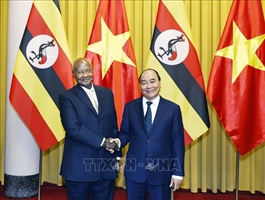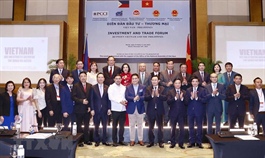Macroeconomic and monetary policies key to improving economy
Macroeconomic and monetary policies key to improving economy
A volatile global market, the COVID-19 pandemic, approaching the limit to horizontal expansion and inefficient macroeconomic policies in the past were among the major factors holding back Viet Nam's economic development, according to the Vietnam Center for Economic and Strategic Studies (VESS).

In a report on the country's macroeconomics and long-term growth, Prof Pham The Anh, VESS's chief economist, said the Vietnamese economy experienced robust development during the 1991-2021 period, maintaining an annual 6.57 per cent GDP growth. By the end of last year, the country's GDP reached US$363 billion, breaking into the world's top 40 economies. The government has also managed to keep inflation in check while increasing the national foreign exchange reserve tenfold in the 2010-21 period.
Viet Nam's GDP per capita reached $3,700 in 2011, a 400 per cent increase from the same figure in 2011. However, in terms of GDP in purchasing power, the Southeast Asian economy still trailed behind major world economies at just 17 per cent of the US, 24-26 per cent of Japan and South Korea, 40 per cent of Malaysia, and 61 per cent of Thailand and China.
Anh said the country's public debt has been rising in recent years, posing risks to long-term economic development. During 2010-21, Viet Nam's debt increased from VND1.144 to VND3.655 quadrillion, a 320 per cent increase in a period of ten years. To make matters worse, public debt increased by 11.3 per cent annually, outpacing economic growth.
In addition, Viet Nam's economy remained heavily reliant on FDI and export. The country's fast-growing export sector, with an annual growth rate of 18.4 per cent during the period, far outpaced its GDP. In the last few years, Viet Nam recorded $20 billion in FDI, more than double the previous 10-year period.
State budget collection remained high at an average of 11.5 per cent annually in 2011-15 and 8.8 per cent in 2016-20. Viet Nam's State budget collection on GDP increased from 23.6 per cent to 25.2 per cent, the highest among ASEAN 5.
Priorities
Curbing inflation remained the country's top priority in the next phase of economic development, according to Anh. It's crucial that Viet Nam's monetary policy stay prudent, keeping supply in check in the coming years.
Budget discipline and transparency were still among the major shortcomings, posing the risk of causing uncertainty in the economy.
"The US economy provides us with a good example. Most of the time businesses were able to predict the FED's next move in adjusting interest rates fairly accurately," he said.
Anh said it was only possible because most economic information regarding the financial market, inflation, exchange rate, and unemployment data were made available to the public, significantly reducing the risk of causing economic shocks.
In comparison, Viet Nam's monetary policy appeared unpredictable. Interest rates could remain unchanged for an extended period of time, yet could be adjusted by 1-2 percentage points within a few weeks.
"Sudden moves as such can introduce a lot of uncertainty and put businesses and consumers alike at risk," he said.
He urged the government to focus on macroeconomics, improve system stability and consider employing a floating exchange rate model instead of the current fixed exchange rate model.
"It rarely works," Anh said.
While interest rates have reached the double-digit figure in Viet Nam in recent months, ASEAN-5, who employ a floating exchange rate model, has successfully kept it low at a 3-5 per cent increase. Economists have long voiced concerns over the government's excessive intervention in the economy.
For example, commercial banks' credit ceilings have been largely counter-productive in controlling inflation. Anh said banks should be free to follow market principles, as long as they comply with safety and market standards. Instead, the government should focus on tightening the money supply via the State Bank of Vietnam and supervision of poor-performing banks.





















